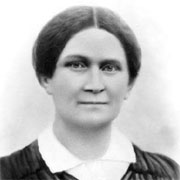Search results for "herbert lomas/www.booksfromfinland.fi/2004/09/no-need-to-go-anywhere"
Summer madness
27 June 2012 | Non-fiction, Tales of a journalist

Illustration: Joonas Väänänen
In the endlessly long days of the brief Nordic summer, what could be better than to go on a bender? Jyrki Lehtola explores a quaint Finnish custom
In Finland it’s cold and dark for nine months of the year. We spend the other three months drunkenly praying that tomorrow it might be warmer and lighter – and sometimes it is.
From the perspective of the national psyche, you’d think we might have learnt to live with the cold and the dark. We might have dealt with it and turned it into something useful to us and to our continued survival. Sadly though, this isn’t quite the case. For nine months we sit indoors staring at the television, complaining that there’s never anything worth watching and waiting for those three months to come so that we can go outside again.
And when we finally get outside, we go mad. No longer are we a silent, anxious people. Well, we are, but we pretend we’re a different kind of people: one that spends its time chattering joyfully on the beach, dancing, enjoying life, discussing, debating, participating, sharing.
The arrival of summer makes us go mad. By the end of June, this silent, anxious, suicidal nation has turned into the number one samba carnival of Northern Europe. More…
The rocket
30 September 1988 | Archives online, Fiction, Prose
Raketen (‘The rocket’), a novella from the collection Den segrande Eros (‘Eros triumphant’), 1912. Introduction by George C. Schoolfield
The sun shone straight in through the veranda’s little windows that made the whole ‘villa’ resemble a hothouse. With a sigh, Elsa let the morning paper fall to the floor; she had gotten halfway through the classified ads: ‘Three lads wish to correspond with likeminded lasses.’ ‘If Mr Söders-m does not fetch his effects, left as bond for unpaid rent, within a week, they will be regarded as our property, and his name will be published in toto.’ Now she could stand no more. The air seemed to come from a bakeoven. Listlessly, she watched two flies as they flicked the ceiling paper in their humming dance of love. It seemed as though knives were being thrust into the back of her head; that was the way her sick headaches began. A long walk might stop it, she knew, but she felt too tired.
At last, she was able to make herself get up and open the door for some fresh air. But with the air she got a powerful smell of roasting pork from the baker’s villa; the yells of the children playing cops and robbers up on the rock were doubled in force. A nasty stabbing sensation began in Elsa ears. And so she decided to take a walk after all, but only to the steamboat jetty. More…
The Conference
31 December 1978 | Archives online, Fiction, Prose
A short story from Alamaisen kyyneleet (‘Tears of an underdog’, Karisto 1970). Introduction by Pekka Tarkka
Dr Smith said that he did not believe that any immediate threat of an invasion from Space was likely to arise for some time. Observations to date had given no support to the view that any such preparations had been put in hand. Technically they were of course ahead of us, but in his opinion there was no cause for panic. Nor could he endorse the widespread but naive assumption that any confrontation with beings from Space must inevitably lead to war. If human beings had reason to feel threatened, it was from each other that the chief threat came. He urged the Conference to work for a situation in which every country would be preparing for peace rather than for war. He said he had no wish to sound sardonic, but that he had noticed that when war was prepared for, it was usually war that ensued. More…
Hatefully yours
23 December 2011 | Non-fiction, Tales of a journalist
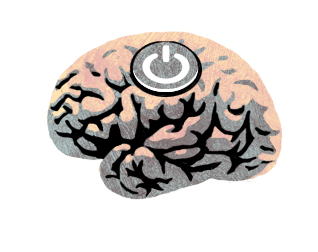
Illustration: Joonas Väänänen
In the new media it’s easy for our pet hatreds to be introduced to anyone who is interested. And of course everyone is interested, how else could it be? Jyrki Lehtola investigates
Twitter, Facebook, Twitter, Twitter, Twitter, Facebook, Twitter, how can we get the revenue model to work by using our old media, Twitter, Facebook, Twitter, Twitter, hey, what about that revenue model of ours, Twitter.
The preceding is a poignant summary of what the Finnish media was like in 2011 when the rules of the game changed like they have changed every year. And we still don’t even fully understand what the game is supposed to be. More…
Breton without tears
31 March 1994 | Archives online, Fiction, Prose
Extracts from Euroopan reuna (‘The edge of Europe’, Otava, 1982). Introduction by H. K. Riikonen
I am reading a book, it says pour l’homme latin ou grec, un forme correspond à un être; pour le Celte, tout est metamorphose, un même individu peut prendre des apparences diverses, so it says in the book. A strange claim, considering that the word metamorphosis is Greek, and that the best-known book about metamorphoses, Ovid’s Metamorphoseon libri XV was written in Latin. In the myths of all peoples, at least the ones whose oral poetry was recorded in time, such as the Greeks, Serbs, Slavs, Finns, or Aztecs, metamorphoses play a very important part, the Celts are not an exceptional tribe in this respect. The author must mean that the Celts still live in mythical time, the time of metamorphoses when the human being assumed shapes, was able to fly as a bird, swim as a fish, howl as a wolf, and to crown his career by rising up into the sky as a constellation. Brittany is part of the Armorica Joyce tells us about in Finnegans Wake, that book is incomprehensible if one does not know Ireland, and now I see that Brittany is the key to one of the book’s locked rooms. I thought I already had keys to all the rooms after Dublin, the Vatican, and Athens, but one door was and remained closed, the key is here now, in my hand, I can get into all the rooms in the book, and I am home even if I should happen to get lost. The room creates the person, she becomes another when she goes from one room to another, this is metamorphosis, and when she leaves the house she disappears, she no longer exists. The legend on the temple at Delphi, gnothi seauton, know thyself, has led Occidentals onto the false track that is now becoming a dead end, polytheistic religions correspond to the order of nature, but as soon as the human starts to imagine that she knows herself, as soon as the metamorphic era ends, monotheism is born, the human being creates god in her own image, and that is the source of all evil. Planted like traffic signs at the far end of this cul-de-sac stand the hitlers and brezhnevs and reagans and thatchers, new leaves are appearing on the trees, the sun is shining. Landet som icke är* är en paradox: landet blev befintligt därigenom att Edith Södergran sade att det icke är. On the sea sailed a silent ship*, as I tracked my shoeprints across the sand on the beach, it was like walking on a street made out of salty raw sugar, I felt desolate. The wind bent the grasses, the sun warmed the back of my sweater, of course the sun always has the last word, I thought, things should be as they are, this thought gave me peace of mind. I walked past the cows, two of them already chewing the cud, the others still grazing, they stood in a line and raised their heads, stood at attention, as it were, as I walked past. I was not entirely sure that I was heading in the right direction, but then I saw the boucherie and knew that there was a café nearby. Madame greeted me in a friendly fashion, brought me a calvados and a beer and sat down for a chat, wanted to know if I liked the countryside here. I said that things looked the same here as in Ireland, she said that was true, but she had never been to Ireland. I finished my drinks and paid, left, decided to walk along the beach. I saw gun emplacements and two bunkers. I crawled into a bunker. Inside, it was dark and damp. I looked through the embrasure at the sea. I thought of the boys who had been incarcerated here. They had been given a death sentence. I examined a rusty object, what was it, I looked at it more closely, it was an axle from a gun’s undercarriage. As I arrive in my home yard, I note that the lilacs are beginning to bloom. More…
The joy of work
24 October 2011 | Fiction, Prose
Short prose from Sivullisia (‘Outsiders’, Like, 2011). Introduction by Teppo Kulmala
Since I’ve been unemployed, I started a blog called Outsiders. It soon came to serve as work, and I became dependent on its benefits. Although describing being an outsider helped to anaesthetise me, and verbalising all of my afternoons didn’t even take up all my time, the feedback that came in was reward enough. I wouldn’t have taken any other reimbursement anyway because of the restrictions set on recipients of government benefits. Increasingly frequently I found myself longing for more. Even a short blog comment about being an outsider felt even truer than what I with my self-employed, jobless person’s competence was able to achieve in relation to being sidelined as an unemployed person, regardless of what kind of manager I had been in my previous life. When asking for more accounts of other people’s well-being, I wanted them to use their own names. I justified this because I did not want to read lies, which often come from and lead to chatter in cafés and on the web. Apart from the pure enjoyment of being present, using one’s own name – even in wrong-headed topics or notions – makes it easier to approach the harsh laws of the working world. When one knows that by using one’s own signature one is dragging one’s family into the mire, including those who have gone before and those yet to come, one is able to blaze trails along which one can outflank the passive to activate another, equally unemployed. I did not place any further requirements on the other commenters besides first name and surname, as the rules had been drawn up by professionals in their own field. The regulator’s work also requires skill, if not a tremendous craving, for damming up another flood of text so that one’s own advantages do not have a chance to dry up. To facilitate reading for myself and others, I introduced only a couple of restrictions, which I imagined that I, too, would be able to adhere to. Only one side of a sheet of A4 was to be used – that is, one page – and what people wrote had to be true. Truth, beauty and quality ensured that everyone would begin what they had to say by writing about their current work. More stories, anecdotes, even poems piled up than the law permits me to read – much less compile – during working hours. For this book I have selected only 157 stories from the Greater Helsinki area for the sake of efficiency. The faster you can read the work, the less time it will distract you from your main job. I chose to limit things to the capital area so that the stories about well-being from individuals linked to this place would seem to form a more integral work, or document at least, about what was happening in the Big H, the centre of the nation, at the start of the millennium. I will publish the tales of work from beyond the outer ring road at some later stage, if I manage to come to an agreement with the writers concerning intellectual property rights. More…
Bonfires in the garden
6 March 2014 | Fiction, poetry
Poems from Inga stjärnor i natt, sir (‘No stars tonight, Sir’, Schildts & Söderströms, 2012). Introduction by Jukka Koskelainen
With us on the cruise was
an old, old man.
We wondered what
he was doing there.
He sat at a table by himself.
Silent. Drinking water.
Never turned up at the cabaret
or the ballroom.
Once he asked the receptionist,
rumour had it, if it was possible
to go out into the fresh air,
there beneath the stars.
‘No stars tonight, sir!’
said the man in the hatch.
The old man wasn’t seen again
until we reached land.
Wonder what happened to him.
Not that it’s any of our business.
![]()
Marginal notes
4 June 2009 | Essays, Non-fiction
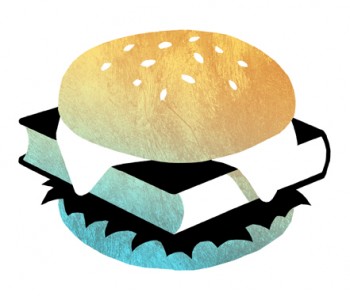
Fast food for thought? Culture meets business. – Illustration: Joonas Väänänen
Extracts from a collection of writings, Ulkona (‘Outside’, Siltala, 2008)
Literature – and ‘serious’ writing in particular, the kinds of texts we publish in Books from Finland – is often seen as lost, irrelevant, pushed out to the edge of mainstream popular culture. But, argues Hannu Raittila, the margin is actually the area of greatest freedom. Everything worthwhile happens there – and business would do well to imitate art, rather than the other way round
It is easy to see culture as a marginal part of society, if viewed from an economic perspective. It is easy to see literature, for its part, as a marginal phenomenon even when compared with other areas of culture – pop music, for example. More…
Mother-loves
31 March 1994 | Archives online, Fiction, Prose
Extracts from the novel Ihon aika (‘The time of the skin’, WSOY, 1993). Introduction by Suvi Ahola
In the hospital they stare at us, enquiringly, as if we are abandoning her. They look in turn at our mother’s half-conscious, ulcerous body, at the nurse who, curling her lip, cuts mother’s knickers, housecoat and apron off her, at us, the exhausted ones, who are now only at the beginning of our real work. They fill in their forms and ask their official questions; they do not know how anguished and relieved we shall be in a moment when we may leave our mother to them, that ironically smiling, wounded woman who is still, with her last strength, attempting to kick the nurse who is pouring warm water on her bloody feet.
I gaze at mother’s battered body with something like greed; I feel the same kind of curiosity toward this shocking sight as when I was four and we were in the bathroom together. I was shy, I tried to spy on mother’s fleshy body, her luxuriantly curving skin, through the mirror, but I was always left with the feeling that I had seen too little, I had been able to understand only a small part of what my eyes had registered. More…
The coder’s Latin
30 October 2014 | Articles, Non-fiction

Pleasant interface still? Old book bindings (Merton College library, Oxford, UK). Photo: Wikipedia
Writing is arguably brain-control technology, notes our columnist Teemu Manninen. Writing might not be on its way out, at least not quite yet, he thinks, but the printed book might not stay with us for ever. And would that be a happier world?
When the future of literature is discussed, either here in Finland and elsewhere, topics usually revolve around changes in the economics and practicalities of reading, writing, and publishing: how will writers and publishers get paid, and how can readers find more books to read.
What is taken for granted in these instances is that literature itself will continue to be something that exists in a recognisable way – which itself of course implies that writing itself will remain a viable mass medium for the transmission of information over the transcendent, enormous, unfathomable gulfs of space and time, as it has been for thousands of years. More…
The lake
30 June 1988 | Archives online, Fiction, Prose
Järvi (‘The lake’), a short story, 1915. Introductions by Kai Laitinen and Pekka Tarkka
I travel the world, not out of any desire for adventure, but because that is the way things have happened. The best of my wanderings are in obscure, tucked-away regions, where life is humdrum and pitched in a low key. There I have no need to stave off nostalgia for the past by leading a hectic life: my days go by in stolid succession from season to season, I am an ordinary unimportant individual among all the rest. For long stretches of time my life does not strike me as being either dull or bright; I derive a certain satisfaction from its very emptiness. It is as though I were, by degrees and to the best of my ability, paying off a kind of debt. More…
Moomins, and the meanings of our lives
21 December 2012 | This 'n' that
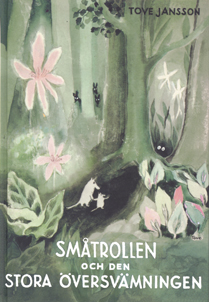
The first ever Moomin story, 1945
Tove Jansson’s Moomin books are widely cherished by children and adults alike. They are funny and charming yet haunting and profound. Lovable Moomintroll; practical and sensible Moominmama; spiky Little My; the terrifying yet complex monster, Groke – Jansson’s creations linger in the mind.
The first ever Moomin book – The Moomins and the Great Flood (Småtrollen och den stora översvämningen, 1945) – was published in the UK in October by Sort Of Books, but Jansson’s writing for adults is also achieving recognition in the English-speaking world.
A Winter Book, a selection of 20 stories by Jansson (Sort Of Books, 2006) was the trigger for a recent event on London’s South Bank. Along with journalist Suzi Feay and writer Philip Ardagh, I was invited to talk about Jansson’s work in general and about these stories in particular.
As Ali Smith notes in her fine introduction to the collection, the texts are ‘beautifully crafted and deceptively simple-seeming’. They are, as she puts it ‘like pieces of scattered light’. She also refers to the stories’ ‘suppleness’ and ‘childlike wilfulness’.
‘The Dark’, for example, offers an apparently random set of snapshots of childhood. Arresting images abound – swaying lamps over an ice rink, swirls in the pattern of a carpet that turn into terrible snakes – to create a tapestry of childhood. It’s like a dream: of ice and fire, fear and safety, a mixture that recalls the secure yet scary world of Moomin valley.
‘Snow’, too, conjures childhood fear. The house that features in this story is unhomely or uncanny, to refer to Freud, and seems haunted by the ghosts of other families. The story ends with the shared resolution between mother and child to return to a place of safety: ‘So we went home.’
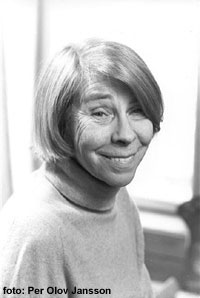
Tove Jansson (1914–2001)
The combination of scariness and safety, of comfort and unease, is one of the things that makes Jansson (1914–2001) such a powerful writer, not only for children – although questions of security and fear might have especial resonance in early life – but also for adults, who continue to be haunted by the unknown, but also tempted by it.
The South Bank event also gave participants and audience the chance to talk about other works by Jansson. The Summer Book (Sommarboken, 1972) notably, is a delicate and deft evocation of a summer spent on an island.
The narrative charts the relationship between a grandmother and granddaughter, and at the same time probes such profoundly human questions as love and loss, hope and change and continuity. As always in Jansson, the descriptions are sharp and crisp, and the writing is at once spare and suggestive.
Novels like Fair Play (Rent spel, 1989) and The True Deceiver (Den ärliga bedragaren, 1982) reveal Jansson’s subversive, sly, and subtle sides, which sit alongside her playfulness, warmth, and humour to create a unique aesthetic. Fair Play is a book about the relationship between two women; it’s tender, funny and thoughtful. Never sentimental, it is nonetheless moving. And it’s quietly subversive in its matter-of-fact depiction of a same-sex relationship.
The True Deceiver is set in a snowbound hamlet. A young woman fakes a break-in at the house of an elderly artist, a children’s book illustrator, and a strange dynamic develops between the two women. It’s a book about being outside, about not belonging. The relationship between the women, which is never fully resolved or explained, is especially fascinating.
Jansson excels at showing the human need for both company and privacy, intimacy and autonomy. And her work is profoundly philosophical. In very light, nimble narratives, Jansson explores the meanings of our lives.


